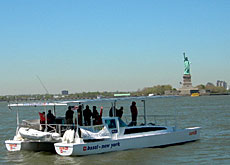Solar power needs a boost

Swiss solar specialists have called for a massive increase of sun-generated heat and power by 2020, covering at least ten per cent of domestic electricity needs.
The demand from the country’s industry comes as the gap between Switzerland’s pioneering research in the field and actual use of solar power continues to widen.
Just last month, Swiss know-how was on show in New York with the arrival of Sun21, the first solar-powered boat to cross the Atlantic. The result was no surprise for Stefan Nowak, head of the solar energy programme at the International Energy Agency.
“Switzerland is among the top countries when it comes to research and development,” he told swissinfo.
Yet when it comes to domestic solar energy use, the Swiss are dragging their feet, or so it seems. Last year, sales of solar-powered products and related services only reached SFr22 million ($17.9 million) – a small figure compared to worldwide turnover worth SFr15 billion.
The solar power professionals association, Swissolar, wants to see that change. They would like to see the amount of solar heating used increase 20 times and sun-generated electricity twice as much.
The aim is to have one square metre of solar panels per inhabitant by 2020, with public services leading the way. If its targets are reached, two thirds of the country’s hot water will come from the sun, while one tenth of its electricity requirements will be covered.
The proposal is similar to the European Union’s own solar action plan, and its goals can be reached according to Swissolar.
It says that there is more than enough roof space available that could be used for solar systems, and that if those surfaces were entirely covered they could provide a third of the country’s electricity and half of its heating.
Hot water heating is definitiely a growth market for the solar industry. In 2006, sales increased by a third, while the domestic market for solar electricity panels stagnated.
In Europe, solar heating was up by almost 50 per cent last year, and solar power rose by more than a third.
Alternative energy sources
The slow growth of Switzerland’s solar market contrasts with official and public concerns about ecology and climate change.
Energy specialists say this is because of the strength of the national hydropower industry, but also because businesses have yet to turn to alternative sources for electricity.
Michael Kaufmann of the Federal Energy Office reckons that the government has also failed to adequately promote solar power. To suggestions that this type of energy is not adapted to the Swiss climate, he answers that Switzerland’s neighbour Austria has ten times more panels.
For the moment, the biggest problem remains the cost of solar power. While using the sun to heat water is now economically viable says Kaufmann, solar electricity remains an expensive option even though the price of fossil fuels continues to rise.
In the meantime, Swiss solar specialists will look abroad to expand their business. Last year, they exported SFr350 million worth of products.
swissinfo with agencies
In 1990, a solar-powered car designed by Biel’s engineering school won the World Solar Challenge across Australia.
More recently, the Sun21 boat successfully completed a trans-Atlantic crossing.
In 2009, a 30-metre boat known as Planet solar will try to circumnavigate the globe.
And in 2011, Swiss adventurer Bertrand Piccard hopes his Solar Impulse aircraft will fly around the world.
Switzerland receives about 40,000 billion kilowatt/hours of sunshine annually, or 220 times more than the country’s entire energy requirements.
There are more than 40,000 solar heating systems with a total surface of around 350,000 square metres.
Another 1,800 solar electricity systems are ties to the power grid, and countless others are in private hands, with a total surface of 170,000 square metres.
Altogether they produce 0.3% of the country’s heating requirements and 0.03% of its electricity.
Switzerland has 400 million square metres of roof surfaces that could be used for solar energy.

In compliance with the JTI standards
More: SWI swissinfo.ch certified by the Journalism Trust Initiative










You can find an overview of ongoing debates with our journalists here . Please join us!
If you want to start a conversation about a topic raised in this article or want to report factual errors, email us at english@swissinfo.ch.